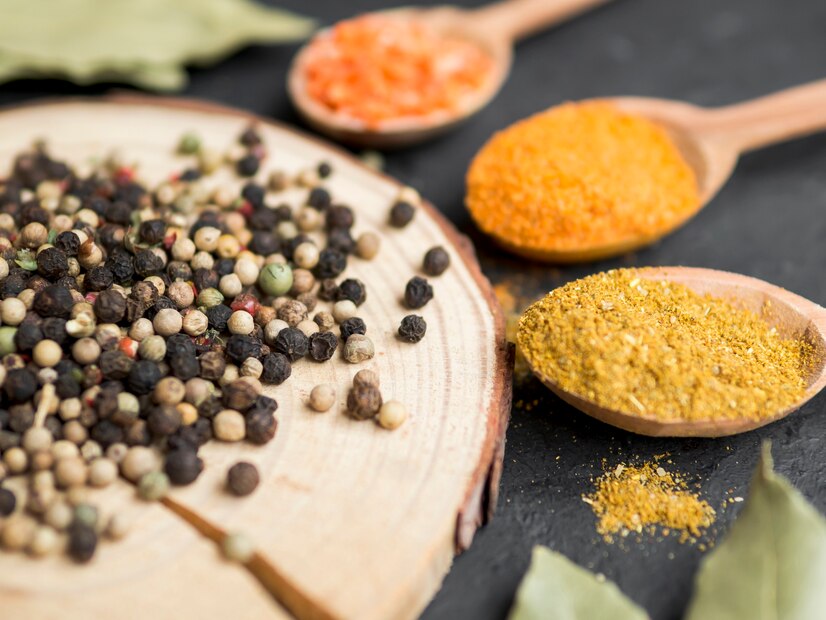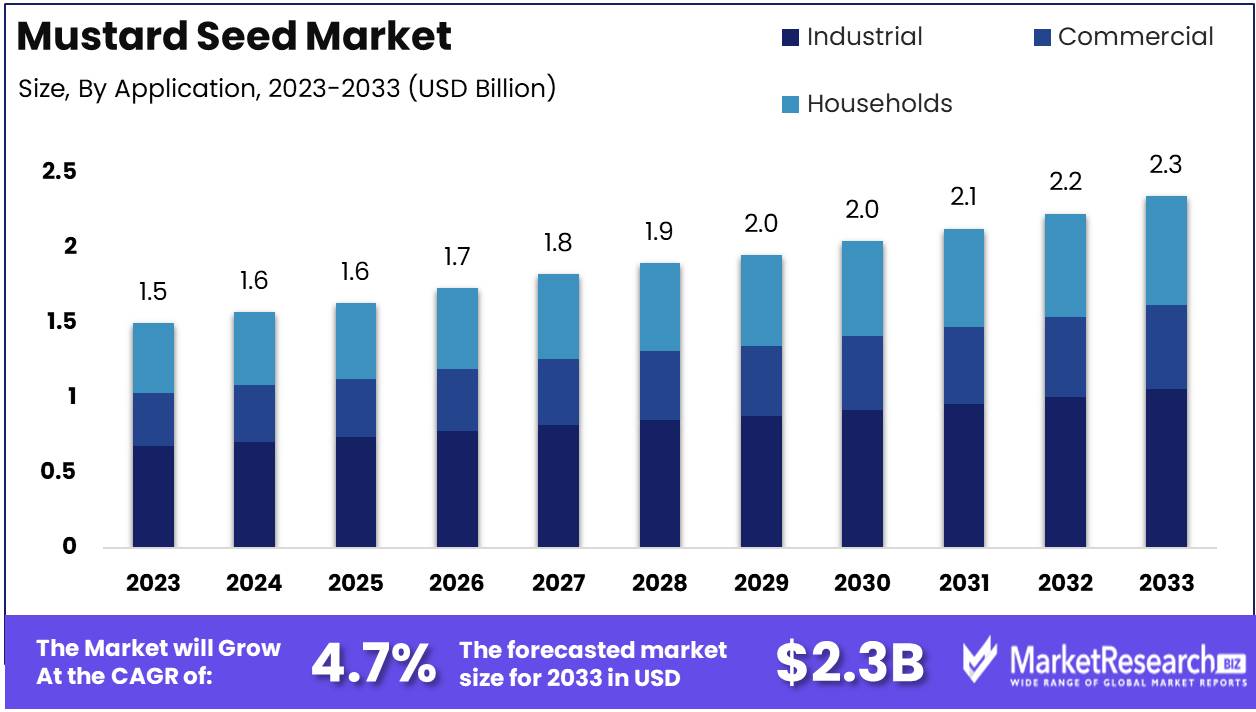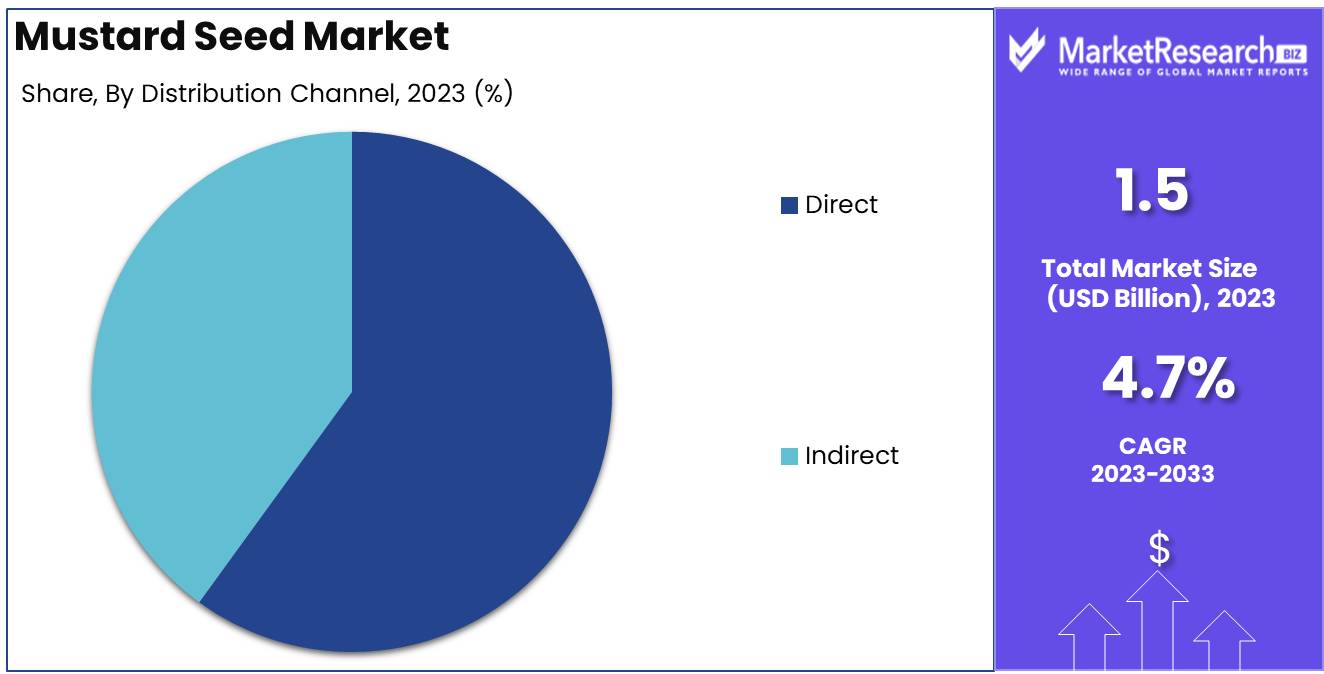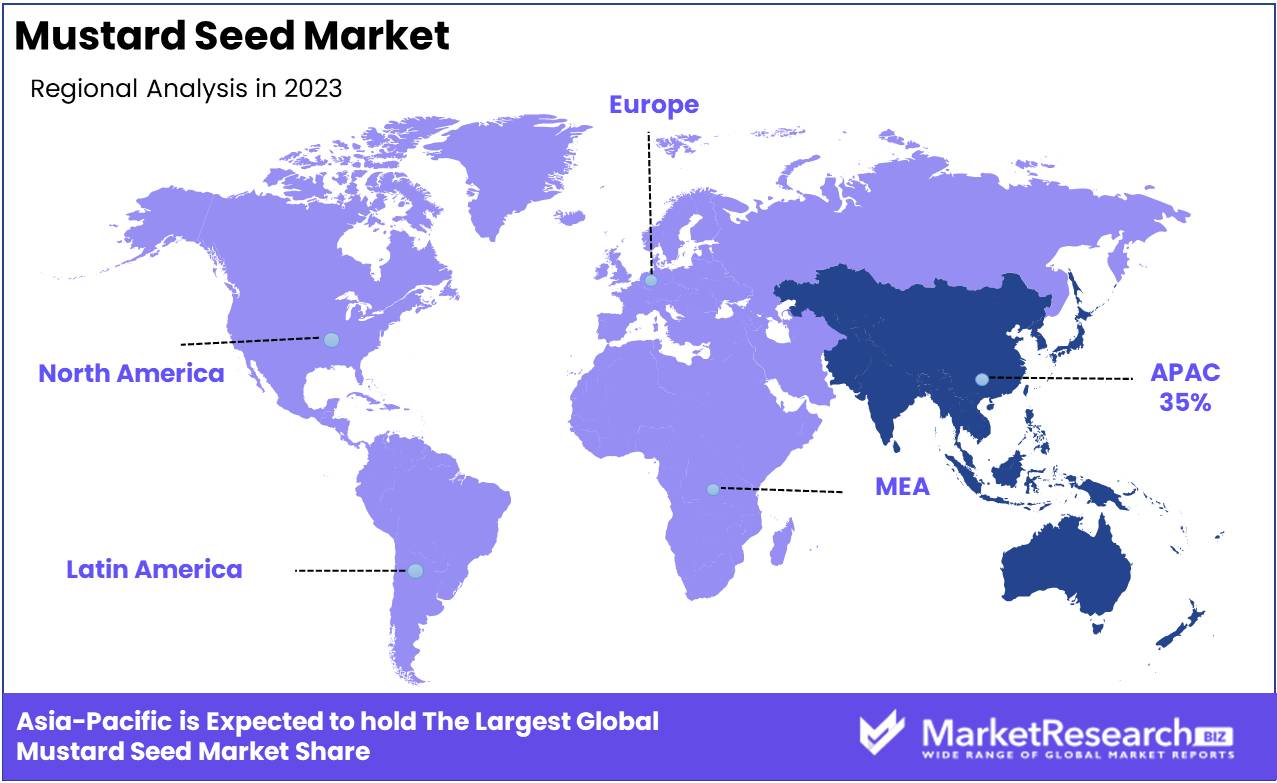
Mustard Seed Market By Product Type (White/Yellow Mustard Seeds, Black Mustard Seeds, Sarepta Mustard Seeds), By Application (Industrial, Commercial, Households), By Distribution Channel (Direct, Indirect), By Region And Companies - Industry Segment Outlook, Market Assessment, Competition Scenario, Trends, And Forecast 2024-2033
-
12120
-
August 2024
-
300
-
-
This report was compiled by Shreyas Rokade Shreyas Rokade is a seasoned Research Analyst with CMFE, bringing extensive expertise in market research and consulting, with a strong background in Chemical Engineering. Correspondence Team Lead-CMFE Linkedin | Detailed Market research Methodology Our methodology involves a mix of primary research, including interviews with leading mental health experts, and secondary research from reputable medical journals and databases. View Detailed Methodology Page
-
Quick Navigation
Report Overview
The Mustard Seed Market was valued at USD 1.5 billion in 2023. It is expected to reach USD 2.3 billion by 2033, with a CAGR of 4.7% during the forecast period from 2024 to 2033.
The Mustard Seed Market refers to the global trade and production of mustard seeds, which are primarily used in the food industry for making condiments such as mustard, and as an ingredient in various culinary applications. This market is driven by increasing consumer demand for natural and organic products, rising awareness of mustard seeds health benefits, and their versatile applications in food processing.

The mustard seed market is experiencing significant dynamics driven by a confluence of emerging trends and evolving consumer preferences. The rising demand for organic products has markedly influenced market growth, with consumers increasingly prioritizing natural and sustainable food options. This shift is reflected in the expanding market for organic mustard seeds, which are perceived as a healthier and more environmentally friendly alternative to conventionally grown seeds.
Additionally, innovation in product offerings has further propelled market expansion. Companies are actively exploring new product formulations and processing techniques to cater to a diverse range of consumer needs, enhancing the versatility and appeal of mustard seeds across various applications.
However, the mustard seed market is not without its challenges. Climate sensitivity remains a critical factor, as the cultivation of mustard seeds is highly susceptible to climatic variations. Changes in weather patterns and extreme conditions can adversely affect yield and quality, posing risks to market stability. In response, there is a growing emphasis on sustainability and organic farming practices, which aim to mitigate environmental impact and improve resilience. The integration of sustainable agricultural practices and advancements in organic farming techniques are expected to play a crucial role in stabilizing supply and supporting long-term market growth. Overall, while the mustard seed market is buoyed by favorable consumer trends and innovation, addressing climate-related challenges and embracing sustainability will be essential for maintaining its trajectory.
Key Takeaways
- Market Growth: The Mustard Seed Market was valued at USD 1.5 billion in 2023. It is expected to reach USD 2.3 billion by 2033, with a CAGR of 4.7% during the forecast period from 2024 to 2033.
- By Product Type: White/Yellow Mustard Seeds dominated the mustard seed market globally.
- By Application: The Industrial segment dominated the mustard seed market.
- By Distribution Channel: Direct Distribution is dominated by cost efficiency and niche access.
- Regional Dominance: Asia-Pacific dominates the mustard seed market, holding over a 35% largest share.
- Growth Opportunity: The global mustard seed market will expand through innovations in product development and technological advancements in agriculture.
Driving factors
Rising Health Consciousness Driving Demand for Mustard Seeds
The growing awareness of health and wellness among consumers has significantly contributed to the expansion of the mustard seed market. Mustard seeds are recognized for their nutritional benefits, including being rich in antioxidants, vitamins, minerals, and healthy fats. This has made them a popular choice for health-conscious consumers who are increasingly seeking natural and organic products as part of a balanced diet.
The rising prevalence of lifestyle-related diseases, such as cardiovascular issues and diabetes, has further fueled the demand for functional foods, which include mustard seeds. Consumers preference for natural remedies over synthetic options also supports the market, as mustard seeds are traditionally used in various cultures for their medicinal properties, such as aiding digestion and relieving muscle pain. This trend toward health-conscious eating is expected to continue driving the growth of the mustard seed market, especially as more consumers adopt preventive health measures through dietary choices.
Diverse Culinary Applications Expanding Market Reach
Mustard seeds versatility in culinary applications has been a significant factor in the market's expansion. They are a staple ingredient in various cuisines worldwide, including Indian, Mediterranean, and European dishes, where they are used in whole, ground, or oil form. The seeds are known for their ability to add a distinct flavor to dishes, making them a preferred spice in both traditional and contemporary cooking.
Moreover, the increasing global popularity of ethnic cuisines has introduced mustard seeds to new markets, further broadening their consumer base. Additionally, mustard seeds are a critical ingredient in the production of condiments such as mustard paste and oil, which are widely used in the food industry. The growing trend of experimenting with flavors and cuisines at home, driven by the rising number of cooking shows and food blogs, has also led to an increased demand for mustard seeds among consumers who seek to replicate restaurant-quality meals in their kitchens. This expanding range of culinary applications is expected to sustain the mustard seed market's growth by continuously attracting new consumer segments.
Growth in Fast Food and Convenience Foods Boosting Industrial Demand
The expansion of the fast food and convenience foods sector has had a considerable impact on the mustard seed market, primarily through increased demand for mustard-based products. Mustard seeds are a key ingredient in many fast food condiments, including mustard sauces, salad dressings, and marinades. As the fast food industry continues to grow, particularly in emerging markets, the demand for these condiments is expected to rise correspondingly.
Additionally, the convenience food sector, which includes ready-to-eat meals and packaged foods, frequently utilizes mustard seeds and their derivatives to enhance flavor and shelf life. The shift towards quick, easy-to-prepare meals, driven by busy lifestyles and urbanization, has led to a surge in demand for these products. As a result, the mustard seed market benefits from the increased production requirements in these sectors. This growth is further supported by the trend of health-conscious consumers seeking healthier fast food options, where mustard-based condiments are often preferred over those with higher calorie content.
Restraining Factors
High Processing Costs: A Major Obstacle to Market Expansion
High processing costs significantly restrain the growth of the mustard seed market. The production of mustard seed oil and other derivatives involves several stages, including cleaning, dehulling, pressing, and refining, each requiring specialized equipment and substantial energy input. The complexity and expense associated with these processes drive up overall production costs, which are often passed on to the consumer. As a result, the price competitiveness of mustard seed products diminishes, particularly in markets where alternative oils or seeds are more cost-effective. This factor is particularly pronounced in developing regions, where producers may struggle to invest in the necessary technology and infrastructure, further inhibiting market growth.
Moreover, the high cost of processing also limits the ability of small and medium-sized enterprises (SMEs) to enter the market. These businesses often lack the capital required to scale operations effectively, resulting in lower production volumes and higher per-unit costs. This dynamic contributes to a concentration of market power among larger, established players, reducing overall market dynamism and potentially stifling innovation.
Supply Chain Disruptions: Amplifying Market Volatility and Uncertainty
Supply chain disruptions represent another critical factor restraining the growth of the mustard seed market. The production and distribution of mustard seeds are highly dependent on a stable supply chain, which includes the timely availability of raw seeds, transportation, and access to international markets. Disruptions in any part of this chain caused by geopolitical tensions, natural disasters, or global pandemics can lead to significant delays, increased costs, and reduced product availability.
For example, geopolitical instability in key mustard seed-producing regions can lead to export restrictions or tariffs, making it more difficult and expensive for manufacturers to secure the raw materials needed for production. Similarly, logistical challenges such as transportation bottlenecks or labor shortages can cause delays, driving up costs and reducing the competitiveness of mustard seed products in the global market.
These supply chain challenges are compounded by the perishability of mustard seeds, which require efficient and timely handling to maintain their quality. Any delays or inefficiencies in the supply chain can result in spoilage or quality degradation, further limiting market growth.
By Product Type Analysis
In 2023, White/Yellow Mustard Seeds dominated the mustard seed market globally.
In 2023, White/Yellow Mustard Seeds held a dominant market position in the By Product Type segment of the Mustard Seed Market. The preference for white/yellow mustard seeds is largely driven by their milder flavor profile, which makes them a versatile ingredient in culinary applications across various regions. These seeds are widely used in the production of mustard condiments, sauces, and dressings, contributing to their significant market share. The rising demand for processed and convenience foods has further amplified the need for white/yellow mustard seeds, especially in North America and Europe. Moreover, the seeds functional properties, such as emulsification and preservation, are highly valued in the food processing industry.
Black Mustard Seeds are known for their pungent flavor and are traditionally used in South Asian, Middle Eastern, and African cuisines. Their market share remains substantial, driven by their application in traditional dishes and condiments, particularly in emerging markets.
Sarepta Mustard Seeds, although less common globally, are gaining traction due to their unique flavor and potential health benefits. They are increasingly being explored in niche markets and for specialized culinary uses, contributing to the diversity within the mustard seed market.
By Application Analysis
In 2023, The Industrial segment dominated the mustard seed market.
In 2023, The Industrial segment held a dominant market position in the Mustard Seed Market, driven primarily by the rising demand for mustard seed derivatives in food processing, pharmaceuticals, and biofuel production. The segment's growth is attributed to the increasing utilization of mustard seeds for producing mustard oil, which is extensively used in industrial applications such as lubricants, biodiesel, and in various food products due to its health benefits and preservative qualities. Furthermore, the pharmaceutical industry has shown a growing interest in mustard seed extracts for their anti-inflammatory and antioxidant properties, contributing to the industrial segment's expansion. This dominance is further supported by advancements in extraction and processing technologies, enabling higher yield and cost-efficiency, thereby enhancing the segment's competitive edge.
In contrast, The Commercial segment has gained prominence due to the expanding use of mustard seeds in the food service industry. Restaurants and food manufacturers increasingly rely on mustard seeds for flavoring and as a key ingredient in condiments, sauces, and dressings. The Household segment also remains significant, as mustard seeds are a staple in home cooking, especially in regions where traditional cuisines incorporate mustard seed oil and whole seeds for flavor and preservation. However, its market share is smaller compared to industrial and commercial applications due to lower consumption volumes. Overall, the industrial segment's dominance reflects the broader trend toward value-added applications of mustard seeds, with commercial and household segments complementing this growth.
By Distribution Channel Analysis
In 2023, Direct Distribution dominated with cost efficiency and niche access.
In 2023, The Direct Distribution Channel held a dominant market position in the mustard seed market. This channel involves the direct sale of mustard seeds from producers to end consumers or businesses, bypassing intermediaries. The rise of e-commerce platforms and direct-to-consumer models has bolstered this segment's growth, offering producers more control over pricing and branding. Furthermore, direct channels enhance customer relationships, fostering brand loyalty and enabling access to niche markets where specialized mustard seeds are in demand. The direct distribution channel's efficiency in minimizing costs and optimizing profit margins has contributed significantly to its leadership in the mustard seed market.
By contrast, the indirect distribution channel, which includes intermediaries such as wholesalers, distributors, and retailers, plays a crucial role in expanding market reach. This segment is particularly effective in supplying mustard seeds to larger markets and regions with high demand, such as food processing industries. While indirect channels offer broader market penetration, they may result in lower profit margins for producers. However, they remain vital for mass-market distribution, enabling producers to scale their operations and access diverse consumer bases across various regions.

Key Market Segments
By Product Type
- White/Yellow Mustard Seeds
- Black Mustard Seeds
- Sarepta Mustard Seeds
By Application
- Industrial
- Commercial
- Households
By Distribution Channel
- Direct
- Indirect
Growth Opportunity
Market Expansion through Innovations in Product Development
The global mustard seed market is poised for significant growth, driven by innovations in product development. The increasing consumer demand for natural and organic products has led to the development of new mustard-based offerings, such as gourmet mustard varieties, mustard oil with enhanced nutritional profiles, and innovative condiments. These innovations are not only expanding the product portfolio but also attracting health-conscious consumers who are seeking alternatives to synthetic additives. The introduction of mustard seeds in diverse applications such as nutraceuticals, cosmetics, and personal care products is expected to create new avenues for market growth.
Technological Advancements in Agriculture
Technological advancements in agriculture are playing a critical role in the expansion of the mustard seed market. The adoption of precision farming techniques, such as the use of drones, satellite imagery, and IoT devices, is improving crop yield and quality. These technologies enable farmers to optimize resource use, monitor soil health, and control pests more effectively, leading to higher productivity.
Furthermore, advancements in seed technology, including the development of hybrid and genetically modified mustard seeds, are enhancing crop resistance to adverse weather conditions and diseases, thereby ensuring a stable supply. This technological progression is anticipated to support the growing demand for mustard seeds across various industries.
Latest Trends
Growing Therapeutic Benefits
The increasing awareness of mustard seeds' therapeutic properties is anticipated to drive market growth. Mustard seeds, rich in bioactive compounds such as glucosinolates, have been linked to various health benefits, including anti-inflammatory, antioxidant, and antimicrobial effects. The rising consumer preference for natural and functional foods is expected to enhance demand for mustard-based products, particularly in nutraceuticals and functional food segments. As consumers become more health-conscious, the therapeutic benefits of mustard seeds will likely be a significant factor influencing market dynamics. This trend is also supported by ongoing research and clinical studies that further substantiate the health claims associated with mustard seeds, thereby boosting their appeal in the global market.
Presence of Diversified Mustard Plant Species
The mustard seed market is expected to benefit from the presence of diversified mustard plant species, which offer a broad spectrum of uses and applications. Varieties such as black, brown, and white mustard seeds cater to different culinary, medicinal, and industrial needs. This diversification allows producers to target multiple market segments, from the food industry to pharmaceuticals and biofuel production. The adaptability of different mustard species to various climatic conditions also ensures stable supply chains, reducing vulnerability to environmental fluctuations. This diversity not only enhances market resilience but also enables producers to innovate and develop new products, further stimulating market growth.
Regional Analysis
Asia-Pacific dominates the mustard seed market, holding over a 35% largest share.
The mustard seed market exhibits varied dynamics across different regions, driven by diverse agricultural practices, consumption patterns, and industrial applications. In North America, the market is primarily fueled by the rising demand for mustard-based condiments and processed foods. The region is also marked by significant domestic production, particularly in Canada, which is one of the world's leading producers of mustard seeds.
Europe holds a substantial share of the global market, driven by the extensive use of mustard seeds in traditional cuisines and the food processing industry. Germany and France are notable consumers in this region.
The Asia-Pacific region dominates the mustard seed market, accounting for over 35% of the global share. This dominance is attributed to the region's vast agricultural land, favorable climatic conditions, and high domestic consumption in countries like India, which is a major producer and consumer of mustard seeds. The region's growth is also supported by the expanding food processing industry.
In contrast, Latin America and the Middle East & Africa represent emerging markets, where the demand is gradually increasing due to the rising popularity of mustard-based products and growing agricultural activities, although their market shares remain relatively smaller compared to other regions.

Key Regions and Countries
North America
- The US
- Canada
- Rest of North America
Europe
- Germany
- France
- The UK
- Spain
- Netherlands
- Russia
- Italy
- Rest of Europe
Asia-Pacific
- China
- Japan
- Singapore
- Thailand
- South Korea
- Vietnam
- India
- New Zealand
- Rest of Asia Pacific
Latin America
- Mexico
- Brazil
- Rest of Latin America
Middle East & Africa
- Saudi Arabia
- South Africa
- UAE
- Rest of the Middle East & Africa
Key Players Analysis
The global mustard seed market is expected to witness steady growth, driven by increasing consumer demand for natural and organic products. Key players in this market, including McCormick & Company Inc., The Tracklement Company Ltd., Kaveri Seeds, Sakai Spice (Canada) Corp, Megha Corporation, Organic Products India, and Sun Impex, are poised to play significant roles in shaping the market dynamics.
McCormick & Company Inc., a leader in the global spices and seasoning industry, is anticipated to leverage its extensive distribution network and brand reputation to maintain a dominant position in the mustard seed market. The company's focus on innovation and product diversification will likely enhance its competitive edge.
The Tracklement Company Ltd., known for its artisanal and high-quality mustard products, is expected to capitalize on the growing trend of gourmet and specialty foods. This company's emphasis on traditional methods and premium ingredients could attract a niche but loyal customer base.
Kaveri Seeds, a key player in the seed industry, is projected to contribute to the market by providing high-yield and disease-resistant mustard seed varieties. Their expertise in seed technology and strong market presence in India could drive their growth.
Sakai Spice (Canada) Corp and Megha Corporation are anticipated to expand their market share through strategic partnerships and a focus on export markets. These companies are likely to benefit from the increasing global demand for spices.
Organic Products India and Sun Impex, both of which specialize in organic and non-GMO mustard seeds, are expected to thrive in response to the rising consumer preference for organic products. Their commitment to sustainable farming practices could enhance their appeal in health-conscious markets.
Overall, these key players are expected to navigate the market through innovation, strategic expansion, and alignment with consumer trends, contributing to the overall growth of the mustard seed market.
Market Key Players
- McCormick & Company Inc.
- The Tracklement Company Ltd.
- Kaveri Seeds
- Sakai Spice (Canada) Corp
- Megha Corporation
- Organic Products India
- Sun Impex
- Others
Recent Development
- In July 2024, the International Crops Research Institute for the Semi-Arid Tropics (ICRISAT) partnered with several mustard seed farmers in India to promote sustainable and climate-resilient farming practices. This initiative is part of a broader effort to enhance yield quality and ensure the long-term viability of mustard seed production in regions vulnerable to climate change.
- In June 2024, the Solvent Extractors' Association of India (SEA) reported a significant increase in the export demand for mustard seeds and mustard oil. This rise is attributed to higher global prices and increased demand from countries such as Bangladesh and Nepal. Indian mustard seed exports have seen a year-on-year growth of approximately 18%.
- In May 2024, Agriculture and Agri-Food Canada (AAFC) announced an expansion in mustard seed cultivation in the western provinces, particularly Saskatchewan and Alberta. This development comes in response to favorable weather conditions and an increase in global demand, with Canada aiming to strengthen its position as a leading exporter of mustard seeds.
Report Scope
Report Features Description Market Value (2023) USD 1.5 Billion Forecast Revenue (2033) USD 2.3 Billion CAGR (2024-2032) 4.7% Base Year for Estimation 2023 Historic Period 2016-2023 Forecast Period 2024-2033 Report Coverage Revenue Forecast, Market Dynamics, COVID-19 Impact, Competitive Landscape, Recent Developments Segments Covered By Product Type (White/Yellow Mustard Seeds, Black Mustard Seeds, Sarepta Mustard Seeds), By Application (Industrial, Commercial, Households), By Distribution Channel (Direct, Indirect) Regional Analysis North America - The US, Canada, Rest of North America, Europe - Germany, France, The UK, Spain, Italy, Russia, Netherlands, Rest of Europe, Asia-Pacific - China, Japan, South Korea, India, New Zealand, Singapore, Thailand, Vietnam, Rest of Asia Pacific, Latin America - Brazil, Mexico, Rest of Latin America, Middle East & Africa - South Africa, Saudi Arabia, UAE, Rest of Middle East & Africa Competitive Landscape McCormick & Company Inc., The Tracklement Company Ltd., Kaveri Seeds, Sakai Spice (Canada) Corp, Megha Corporation, Organic Products India, Sun Impex, Others Customization Scope Customization for segments, region/country-level will be provided. Moreover, additional customization can be done based on the requirements. Purchase Options We have three licenses to opt for Single User License, Multi-User License (Up to 5 Users), Corporate Use License (Unlimited User and Printable PDF) -
-
- McCormick & Company Inc.
- The Tracklement Company Ltd.
- Kaveri Seeds
- Sakai Spice (Canada) Corp
- Megha Corporation
- Organic Products India
- Sun Impex
- Others




